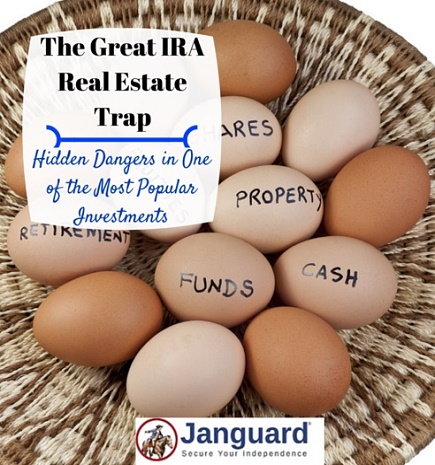People are pouring money into IRA real estate without understanding the traps and consequences
Buying real estate with funds in an individual retirement account (IRA) has been on the rise since the bottom of the housing bust in 2010. The prospect for 7% cash return and an extra 3% return as prices rebounded made IRA real estate a seemingly easy choice for many.
The problem is that many investors are finding out too late that real estate returns in an IRA are not as great as they appeared and there are several hidden traps that could cost them big later down the road.
Think Twice about Your IRA Real Estate Investment

All of the expenses for maintenance, insurance and taxes must come from the IRA funds or from your contributions. This means you’ll likely need to hold a cash cushion in your account to cover these expenses, cash that won’t be earning a return. All of this seriously eats into the actual return on an IRA real estate investment.
Even if retirement account real estate was able to provide higher returns, it’s one of the worst ways to waste your retirement investment. We uncovered how most people waste their 401k plan investments last week by not investing according to a holistic plan that accounts for all their wealth. The idea fits here with real estate as well. Most people already have a large exposure to real estate through their principal residence or other property. Loading up your IRA with real estate risks over-exposure to property prices and another housing crash.
But there’s even bigger traps with IRA real estate investments that most people don’t realize until it’s too late.
The IRS has a long list of disqualified persons that cannot use or provide services to the property. Besides yourself, this includes:
- Your spouse
- Any lineal ascendant (parents) or descendants (children or grandchildren)
- Anyone controlling the IRA real estate investment (investment custodian)
- Any business or entity in which you own 50% or more of the shares or control
None of these people can live in the property, use it as a vacation property or provide services like property management. Your IRA real estate is completely off-limits unless you want to face a hefty fine by the IRS. Since you’ll need a custodian to actively manage the property, you’re likely facing a management fee of at least 10% or more.
You’ll also miss out on another huge benefit of real estate investing, debt leverage. You won’t be able to get a traditional mortgage on your IRA real estate because most mortgages carry a recourse clause. This means that the lender can seize the property in the event you don’t pay the mortgage, something that’s prohibited in retirement accounts. The result, you might find yourself having to pay all cash for your IRA real estate investment.
Make it to retirement with your real estate IRA and you’ll face one of the biggest traps of all. After 70 1/2, you’ll need to pay for a valuation on the property to determine the Required Minimum Distribution (RMD). Your distributions, required or otherwise, must come from the IRA which means the property better be spinning off a lot of cash or you could come up short and will be forced to sell the property.
Better IRA Investment Options
A tax-deferred IRA is one of the best ways to protect your retirement assets from the government and you’ll have more IRA investment options compared to a traditional 401k plan. While real estate may be a great investment, it shouldn’t be held in a tax-advantaged retirement account.
Hold real estate in your taxed investment accounts so you can benefit from the write-off of depreciation and other expenses. For your IRA accounts, consider other investments that may be more appropriate. One of these may be precious metals and silver which are not typically offered with 401k plans. Precious metals offer many of the fundamental investment benefits of real estate including protection from inflation and the collapse of fiat currencies.

